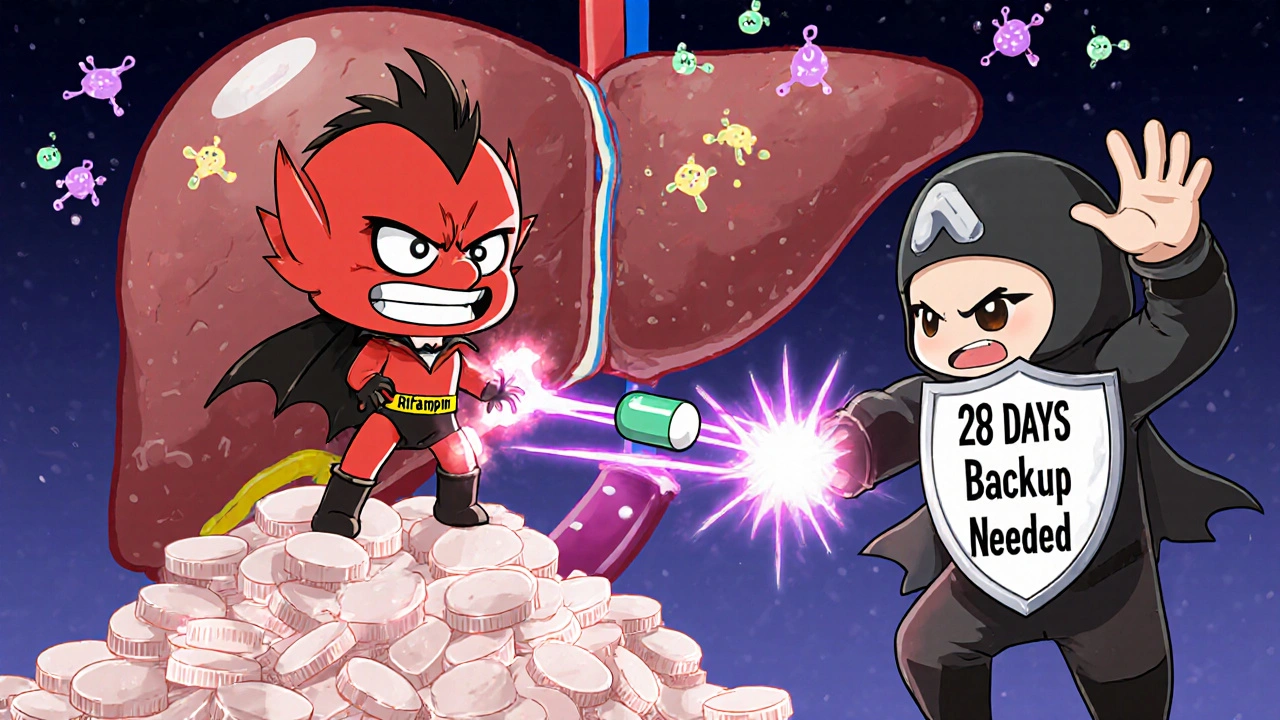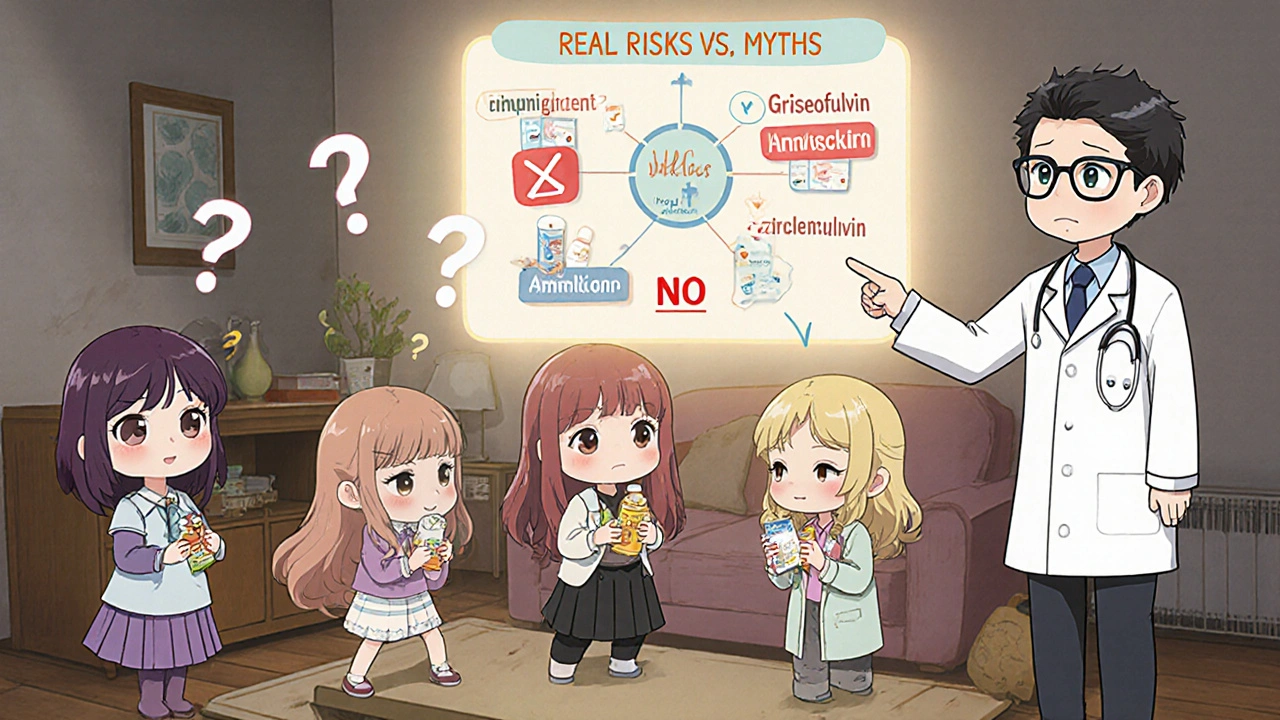Antibiotics and Birth Control Pills: What Really Happens? Facts vs. Myths
26 Nov, 2025For decades, women have been told to use backup contraception when taking antibiotics. You’ve probably heard it from a pharmacist, a friend, or even your doctor: "Just to be safe, use condoms while you’re on antibiotics." But here’s the truth - for almost all antibiotics, that advice is outdated, unnecessary, and based on a myth that won’t die.
Most Antibiotics Don’t Affect Birth Control
Let’s start with the big one: amoxicillin. It’s one of the most common antibiotics prescribed - for ear infections, strep throat, sinus infections, urinary tract infections. If you’re on birth control pills and get prescribed amoxicillin, you don’t need to change anything. No backup method needed. Same goes for azithromycin, doxycycline, clarithromycin, metronidazole, and ciprofloxacin. These are all widely used, and decades of research show they don’t lower hormone levels enough to cause pregnancy.
Back in the 1970s, a few scattered case reports linked birth control failure to antibiotics. Those stories stuck. But those early reports didn’t control for other factors - like missing pills, vomiting, or taking other medications. Later, when scientists ran proper studies, they found no real connection. A 2011 review in Contraception looked at 14 studies and found zero evidence that penicillin-type antibiotics reduce estrogen absorption. A 2020 CDC analysis of 35 clinical trials confirmed that non-rifamycin antibiotics don’t drop hormone levels below the safe threshold.
The One Exception: Rifampin and Rifabutin
There’s one group of antibiotics that actually does interfere - and it’s not what most people think. Rifampin (brand name Rifadin) and rifabutin (Mycobutin) are used to treat tuberculosis and some other serious infections. These drugs are enzyme inducers. That means they crank up the liver’s ability to break down hormones - including the estrogen and progestin in birth control pills.
Studies show rifampin can slash ethinyl estradiol levels by 25% to 50% and progestin by up to 37%. That’s not a small drop. That’s enough to make birth control ineffective. The CDC classifies these as a Category 3 interaction - meaning the risk of pregnancy is real and significant. If you’re on rifampin or rifabutin, you need backup contraception for at least 28 days after finishing the course. That’s not a suggestion. It’s a medical requirement.
What About Griseofulvin?
Griseofulvin isn’t an antibiotic - it’s an antifungal, used for stubborn fungal infections like ringworm or nail fungus. But because it also induces liver enzymes, it behaves like rifampin when it comes to birth control. The CDC and WebMD both say: if you’re taking griseofulvin, use another form of contraception for one month after your last dose. Don’t assume it’s safe just because it’s not called an antibiotic.

Other Medications That Actually Interfere
Antibiotics aren’t the only drugs that can mess with birth control. Some seizure medications do too. Lamotrigine at doses over 300 mg/day and topiramate above 200 mg/day can lower hormone levels. So can certain HIV drugs like efavirenz and nevirapine. And then there’s St. John’s wort, a popular herbal supplement for mood. A 2017 study found it can drop estrogen levels by up to 57% - more than rifampin.
If you’re on any of these, talk to your doctor. Don’t assume your birth control is still working just because you didn’t take an antibiotic.
Why Does the Myth Still Exist?
Here’s the odd part: even though the science has been clear for years, the myth lives on. A 2022 survey by Planned Parenthood found that 62% of women still believe antibiotics reduce birth control effectiveness. Nearly half of them used backup contraception during antibiotic treatment - even when they were taking amoxicillin or azithromycin.
Why? Because pharmacists still tell them to. A 2022 study in the Journal of the American Pharmacists Association found that 35% of pharmacists still recommend backup contraception for all antibiotics. That’s not based on evidence - it’s habit. Fear. Caution gone too far.
Dr. Jen Gunter, an OB/GYN and author of The Menopause Manifesto, says it plainly: "There’s zero evidence that common antibiotics like amoxicillin affect birth control." Dr. Eve Espey, former chair of ACOG’s Gynecologic Practice Committee, calls the myth a "legacy of poorly designed case reports" that got repeated too many times.
What About Rifaximin? It Sounds Like Rifampin
People get confused because of the names. Rifampin = dangerous for birth control. Rifaximin (Xifaxan) = safe. Rifaximin is used for traveler’s diarrhea and IBS. It doesn’t get absorbed into the bloodstream the same way rifampin does. It stays in the gut. So it doesn’t trigger liver enzymes. No interaction. No backup needed.
If your doctor prescribes rifaximin, don’t panic. Just double-check the spelling on the bottle. If it’s not rifampin or rifabutin, you’re fine.

What Should You Do?
Here’s your simple action plan:
- If you’re prescribed amoxicillin, azithromycin, doxycycline, metronidazole, ciprofloxacin, or any other common antibiotic - keep taking your birth control as usual. No backup needed.
- If you’re prescribed rifampin or rifabutin - use condoms or another barrier method for 28 days after your last dose.
- If you’re prescribed griseofulvin - use backup contraception for one month after treatment.
- If you’re on lamotrigine, topiramate, efavirenz, nevirapine, or taking St. John’s wort - talk to your doctor about your birth control options.
And if you’re ever unsure? Ask: "Is this an enzyme-inducing drug?" If the answer is no, you’re likely safe. If yes, ask for specifics.
Why This Matters
This isn’t just about convenience. It’s about trust. When women are told to use backup contraception for every antibiotic, they start to doubt their birth control. They wonder: "Is it really working?" That anxiety leads to missed pills, inconsistent use, and sometimes, unintended pregnancy.
Meanwhile, the real risks - like rifampin - get drowned out by noise. People forget to ask about the actual dangerous drugs because they’re busy worrying about amoxicillin.
Clear, accurate information helps women make better choices. It reduces fear. It improves adherence. And it saves lives.
What’s Next?
Research is still looking at how obesity affects birth control effectiveness. Women with a BMI over 30 already have a 2.5 times higher risk of contraceptive failure, regardless of antibiotics. That’s a growing concern - and one that deserves more attention than whether your sinus infection medication will mess with your pill.
The FDA updated its labeling in January 2023 to clearly state: "Rifampin, rifabutin, and griseofulvin may reduce effectiveness. Other antibiotics do not." That’s a big win. But labeling doesn’t change minds. Education does.
Until more providers, pharmacists, and educators stop repeating myths and start sharing facts, women will keep being told to use condoms for every antibiotic - even when they don’t need to.
